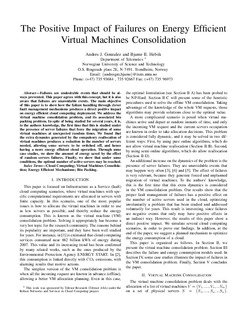| dc.contributor.author | Gonzalez, Andres Javier | |
| dc.contributor.author | Helvik, Bjarne Emil | |
| dc.date.accessioned | 2015-01-15T07:52:19Z | |
| dc.date.accessioned | 2015-04-17T10:50:14Z | |
| dc.date.available | 2015-01-15T07:52:19Z | |
| dc.date.available | 2015-04-17T10:50:14Z | |
| dc.date.issued | 2014 | |
| dc.identifier.citation | Jamalipour, Abbas; Der-Jiunn, Deng [Eds.] ICC 2014 - Proceedings of 2014 IEEE International Conference on Communications p. 4307-4312, IEEE conference proceedings, 2014 | nb_NO |
| dc.identifier.isbn | 978-1-4799-2003-7 | |
| dc.identifier.uri | http://hdl.handle.net/11250/281964 | |
| dc.description | This is the author’s final, accepted and refereed manuscript to the article. | nb_NO |
| dc.description.abstract | Failures are undesirable events that should be always prevented. This paper agrees with this concept, but it is also aware that failures are unavoidable events. The main objective of this paper is to show how the failure handling through clever fault management mechanisms produces a direct positive impact on energy efficient cloud computing deployment. We address the virtual machine consolidation problem, and its associated bin packing problem. In spite of being studied for several years, it is, to the authors knowledge, the first time that this is studied under the presence of server failures that force the migration of some virtual machines at unexpected random times. We found that the extra dynamics generated by the compulsory reallocation of virtual machines produces a reduction in the number of servers needed, allowing some servers to be switched off, and hence having a more energy efficient cloud operation. Through some case studies, we show the amount of energy saved by the effect of random servers failures. Finally, we show that under some conditions, the optimal number of active servers may be reached. | nb_NO |
| dc.language.iso | eng | nb_NO |
| dc.publisher | IEEE, Institute of Electrical and Electronics Engineers | nb_NO |
| dc.title | The Positive Impact of Failures on Energy Efficient Virtual Machines Consolidation | nb_NO |
| dc.type | Chapter | nb_NO |
| dc.type | Peer reviewed | |
| dc.date.updated | 2015-01-15T07:52:19Z | |
| dc.description.version | acceptedVersion | |
| dc.identifier.doi | 10.1109/ICC.2014.6883997 | |
| dc.identifier.cristin | 1195910 | |
| dc.description.localcode | Forfatters versjon, postprint. (c) 2014 IEEE. Personal use of this material is permitted. Permission from IEEE must be obtained for all other users, including reprinting/ republishing this material for advertising or promotional purposes, creating new collective works for resale or redistribution to servers or lists, or reuse of any copyrighted components of this work in other works. | nb_NO |
